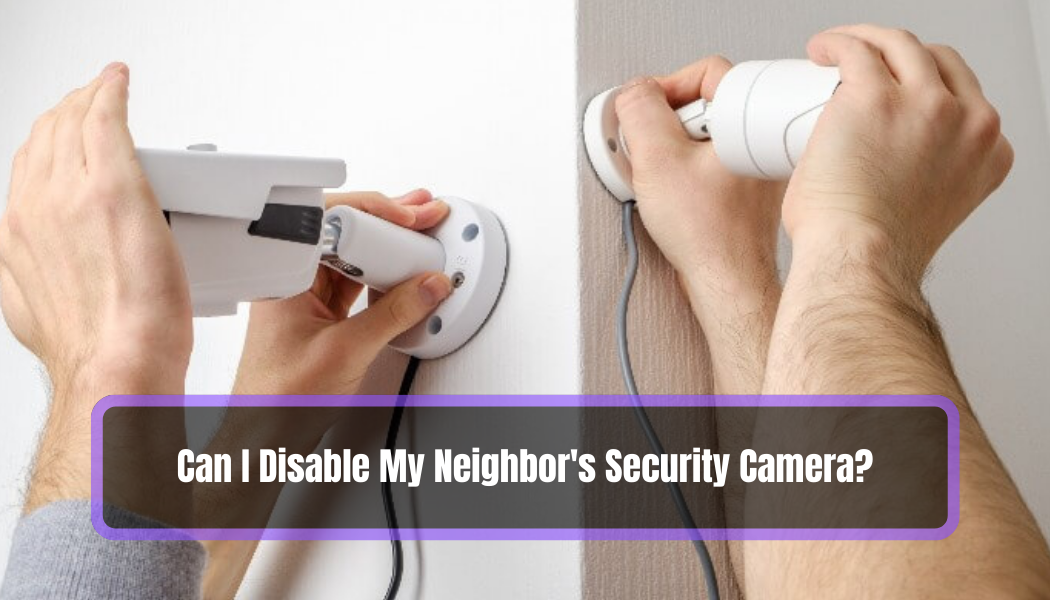With technology advancing, security cameras are now a crucial part of our lives. They keep us safe and give homeowners peace of mind. But as these cameras become more common, we worry about how much they can invade our privacy. One such question that often surfaces is, “Can I disable my neighbor’s security camera?”
Tampering with someone else’s property has legal, ethical, and practical concerns. In this blog post, we will explore the question of security cameras in neighborhoods. We will discuss the legal and ethical aspects surrounding this topic. Also we will discuss the technical challenges and consequences of tampering.
We will provide various solutions for open communication and privacy respect. Our goal is to help you handle this sensitive issue and promote harmony in your community. Let’s explore this intriguing question: Can I turn off my neighbor’s security camera?
Contents
Understanding Security Cameras
Before we dive into the legality and ethics, let’s begin by understanding the basics of security cameras:
- Types of Security Cameras Security cameras come in various forms, including wired and wireless options, as well as indoor and outdoor models. Knowing the type of camera your neighbor uses can impact the potential solutions or concerns.
- Purpose and Benefits of Security Cameras These devices serve as a crucial tool for deterring crime and capturing evidence in case of wrongdoing. Understanding their purpose helps us appreciate their importance in maintaining safety.
- Privacy Concerns While security cameras are valuable for safety, they also raise privacy concerns. Balancing security with privacy is a critical challenge in our modern world.
Neighbor’s Security Camera Legal Implications
Now, let’s explore the legal aspects of disabling a neighbor’s security camera:
1. Laws Surrounding Surveillance:
- Federal Laws: In the US, federal laws like the ECPA and Wiretap Act control surveillance. It is against the law to listen to phone calls or read messages without permission. (15 words)
- State and Local Laws: Surveillance laws can be different in each state or city. Certain states have laws for surveillance cameras, while others have broader privacy laws. It’s crucial to research and understand the specific laws in your jurisdiction.
2. Privacy Rights and the Fourth Amendment:
The Fourth Amendment safeguards people from unfair government searches and seizures. This amendment affects the government and gives people privacy rights. If you mess with someone’s security camera, you might violate their privacy and get in trouble.
3. Consequences of Tampering:
Criminal Charges: Tampering with security cameras can cause problems. like trespassing, vandalizing, or stealing. The charges depend on how you tampered with them.
Fines: If you are found guilty, you may have to pay fines. The amount of the fines depends on the laws in your area and the harm done.
Civil Lawsuits: If you harm someone, they can sue you for money in a civil court. You might have to pay them for the damage you caused to their security camera.
Tampering with security cameras is not recommended, both legally and ethically. If you're worried about your neighbor's security camera, talk to them or get help from a mediator or lawyer. To keep a peaceful neighborhood and follow the law, it's best to solve problems nicely.
Neighbor’s Security Camera Ethical Considerations
Respecting your neighbor’s privacy and maintaining a harmonious neighborhood is equally important:
1. Respecting Neighbors’ Privacy:
Ethical considerations are at the heart of this issue. It’s important to recognize that your neighbors have a right to privacy just as you do. If you want to help, don’t disrupt their security because it invades their privacy. Interfering could cause conflicts and harm trust and goodwill in your community.
2. Communication and Conflict Resolution:
Open and honest communication is the foundation of a harmonious neighborhood. It’s important to talk politely and respectfully about your neighbor’s security camera concerns. Here are some tips for effective communication:
- Choose an appropriate time and place for the discussion.
- Express your concerns without accusing or blaming them.
- Listen actively to your neighbor’s perspective.
- Seek common ground and explore potential solutions together.
- Conflict resolution is a valuable skill in these situations.
3. Seeking Legal Remedies:
If your neighbor’s camera makes you worry about privacy or illegal use, you can take legal action. You can get advice from lawyers or local authorities to help you with legal actions. You can take action like filing a complaint or seeking an injunction if needed. Remember, only use legal remedies as a last resort after trying all other options.
When dealing with your neighbor's security camera, it's important to consider ethics. To have a peaceful neighborhood. we must respect privacy, talk openly, and solve conflicts kindly. It is best to handle these situations with understanding instead of acting alone. Try to find solutions that everyone agrees on, while still being ethical.
Technical Aspects
If you want to learn more about turning off security cameras, here’s what you should know:
1. Technical Challenges:
Disabling security cameras is not a straightforward task and can be technically challenging for several reasons:
- Signal Jamming: Some security cameras are wireless and use radio signals to send video feeds. Disrupting camera operation by jamming signals is complicated and might need special equipment. But, it’s important to remember that jamming signals is hard and illegal in many areas.
- Physical Tampering: Physically tampering with a security camera. Covering or damaging the lens, or cutting power cables, might appear to be a simple solution. If the camera’s owner sees these actions, there could be legal consequences if they find out.
- Risk of Detection: Security cameras can quickly detect tampering and notify the owner. Even if you turn off a camera, the owner might know you messed with it.
2. Risks and Legal Consequences:
Trying to turn off a security camera, by blocking the signal or damaging it, is very risky and can be against the law.
- Criminal Charges: Tampering with someone else’s property, especially with malicious intent, can lead to criminal charges, including vandalism, trespassing, or theft.
- Civil Lawsuits: If your actions cause damage or harm to the security camera or its owner, you may be liable for civil lawsuits seeking compensation for any losses incurred.
- Violation of Privacy Laws: Tampering with security cameras in restricted areas can break privacy laws. Respecting privacy is important. If you violate it, you can get in legal trouble.
3. The Importance of Legal and Ethical Alternatives:
Instead of using fancy gadgets to tamper with your neighbor’s security camera. Try legal and ethical options instead. These alternatives may include:
- Open Communication: You can have a nice talk with your neighbor to share your concerns. And find agreeable solutions.
- Privacy Enhancements: To improve your privacy. you can install curtains or blinds or adjust the camera’s view.
- Legal Consultation: If you think your neighbor’s camera is invading your privacy. Ask legal experts or local authorities for help.
Practical Solutions
Instead of trying to disable your neighbor’s security camera, consider these legal alternatives:
1. Open Communication:
- Initiate a Conversation: Have a friendly conversation with your neighbor. They’re worried about security cameras and privacy. Choose an appropriate time and place to discuss your concerns calmly and politely.
- Express Your Concerns: Explain why the camera makes you uncomfortable or invades your privacy. Your neighbor might not know your worries. Talking can help them understand your point of view.
- Explore Mutually Agreeable Solutions: Be open to hearing your neighbor’s point of view during the discussion. Explore mutually agreeable solutions. Let’s think of ideas that solve both your worries and their need for safety. Finding common ground through communication is often the best way to resolve conflicts.
2. Installing Curtains or Blinds:
- Enhancing Privacy: To maintain your privacy, use curtains or blinds on your windows to block unwanted views. You can use this to make your home more private and attractive right away.
- Adjustable Privacy: Curtains or blinds offer the advantage of adjustable privacy. You can open them when you want natural light and close them when you desire privacy.
3. Adjusting the Camera’s Field of View:
- Simple Adjustments: Sometimes, the issue might be resolved with a simple adjustment to the camera’s angle or field of view. If you feel comfortable doing so, approach your neighbor and discuss the possibility of making minor changes to the camera’s position that respect your privacy concerns.
- Collaborative Approach: Collaborative adjustments can be a win-win solution. Your neighbor can maintain their security, while you gain more privacy.
4. Consulting Local Authorities or Legal Professionals:
- If you can’t solve the problem by talking and finding solutions, and you think someone is invading your privacy, you may need help from someone outside.
- Local Law Enforcement: Contact your local law enforcement agency to discuss the situation and inquire about whether the camera’s placement violates any local ordinances or laws.
- Legal Professionals: Consult with a lawyer who specializes in property or privacy law. They offer legal advice and can help with options like getting an injunction or filing a lawsuit.
Conclusion
As we draw our exploration of the question “Can I disable my neighbor’s security camera?” As we come to an end, we have found a complicated tangle of legal, ethical, and practical factors. The cameras in our neighborhoods make us worry about privacy and being watched. We need to find a balance between protecting our homes and respecting our neighbors.
On our journey, we found out that there are legal ways to handle a neighbor’s security camera if you want privacy. To have a peaceful community, you need to talk openly, listen, and cooperate to solve problems.
Let’s remember that our homes are supposed to be sanctuaries. They should make us feel safe, secure, and respected. To earn trust from our neighbors, we need to talk politely and find realistic answers.
Additional Resources
For more information on surveillance laws and protecting your own privacy, consider exploring the following resources:
Also read our another blog post on neighbor’s security camera privacy:
- Neighbors Security Cameras Trained On Your House – Guardians of Privacy!
- Can I Install Cameras In My Condo
- What to Do If Neighbor’s Security Camera is Invading My Privacy?
- Should Security Cameras be Visible – Simple Guide
These resources can help you understand privacy concerns about your neighbor's security camera. If you're concerned about a neighbor's security camera. this blog post will explain how to protect your privacy.



1 thought on “Can I Disable My Neighbor’s Security Camera: Know Your Rights!”